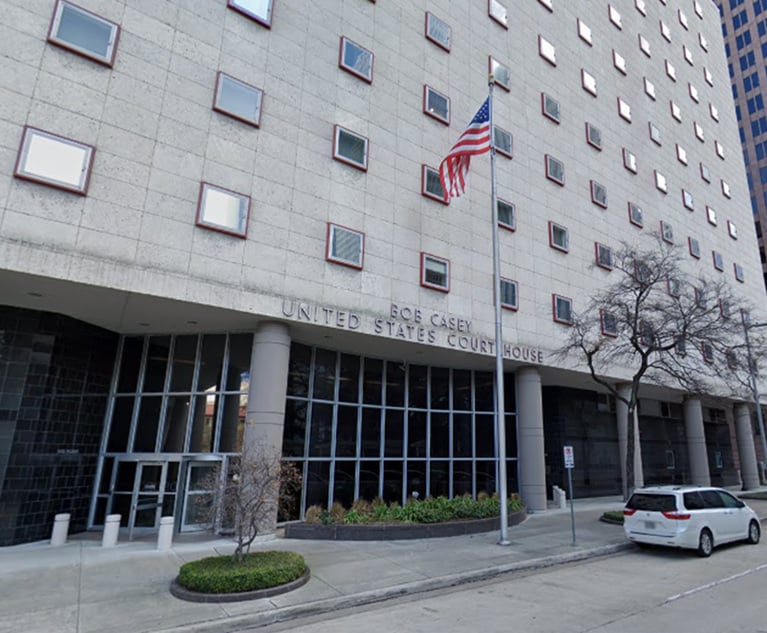There's a New Way to Defend Lawyer Discipline Cases. But for How Long?
"Most attorney disciplinary cases don't involve a communication by a respondent lawyer that the lawyer can credibly claim invokes the anti-SLAPP law. Still, the legislature should fix this issue for good," said Austin solo Jim McCormack.
April 05, 2019 at 03:49 PM
4 minute read
 James McCormack of Austin's Law Offices of James M. McCormack. Photo: Joel Salcido
James McCormack of Austin's Law Offices of James M. McCormack. Photo: Joel Salcido
Lawyers who are in trouble may have a new way to defend themselves in attorney disciplinary proceedings after a court ruling this week—but only if the Texas Legislature doesn't close the window soon.
In Commission for Lawyer Discipline v. Rosales, Austin's Third Court of Appeals made a significant finding that the state's anti-SLAPP law, the Texas Citizens Participation Act, applies in attorney discipline cases. In a concurring opinion, one justice warned that the majority's decision would encourage more and more attorneys to file TCPA motions to dismiss to delay their disciplinary proceedings.
However, as defendant Omar Rosales prepares to appeal the Third Court ruling to the Texas Supreme Court, there's another factor at play—the Texas Legislature has been debating House Bill 2730 to curb the broad application of the anti-SLAPP law.
We asked Austin solo practitioner Jim McCormack, longtime legal ethics attorney who often represents complainants and lawyers in disciplinary proceedings, for his thoughts on the Rosales opinion, its potential impact in attorney disciplinary cases, and how the pending legislation may end that possibility. Here are his answers, edited for brevity and clarity.
What are your personal thoughts and opinions on the Rosales ruling?
McCormack: The concurring opinion by Justice Kelly correctly identifies the problem with the courts applying the anti-SLAPP law to attorney disciplinary proceedings. I have seen one other instance of a respondent lawyer trying to do that, where I was representing the complainant in a grievance. In that case, the respondent lawyer defensively asserted that the anti-SLAPP statute barred the Commission for Lawyer Discipline from pursuing a disciplinary prosecution. The underlying attorney misconduct claim arose out of a written settlement-related communication sent by the respondent attorney to opposing counsel in which a statement was made that the Commission alleged violated a disciplinary rule. I thought then and I still think that the respondent's claim that the anti-SLAPP law applied was nonsense.
The court ruled the TCPA does apply to lawyer-discipline cases. What do you think is the significance or impact of this finding on lawyer-discipline cases in Texas?
McCormack: The Court of Appeals' ruling should have very limited application to attorney disciplinary cases, assuming that the Texas Supreme Court does not reverse. Most attorney disciplinary cases don't involve a communication by a respondent lawyer that the lawyer can credibly claim invokes the anti-SLAPP law. Still, the legislature should fix this issue for good so that these defensive claims don't unnecessarily delay disciplinary proceedings or result in an unfortunate form of immunity from disciplinary action for clear misconduct.
How do you expect attorneys facing discipline cases to use this ruling in their defense, if at all?
McCormack: I assume that respondents would have to argue that they were engaged in protected speech, and that the Commission for Lawyer Discipline was trying to limit or sanction that protected speech. This defense might be more effective in the lawyer-advertising realm than elsewhere since most lawyer disciplinary cases don't involve the sort of speech that the anti-SLAPP statute purports to protect.
There is pending legislation that aims to narrow the scope of the TCPA. In your reading of the bill, how do you think that it would apply to lawyer discipline cases, if at all?
McCormack: The proposed legislation addressing the TCPA appears to fix the problem identified here. It is the problem of legislation generally that it can be hastily enacted without due consideration to its many implications and unintended consequences. And then the legislature has to fix what it did before over multiple legislative sessions as those consequences come home to roost.
This content has been archived. It is available through our partners, LexisNexis® and Bloomberg Law.
To view this content, please continue to their sites.
Not a Lexis Subscriber?
Subscribe Now
Not a Bloomberg Law Subscriber?
Subscribe Now
NOT FOR REPRINT
© 2025 ALM Global, LLC, All Rights Reserved. Request academic re-use from www.copyright.com. All other uses, submit a request to [email protected]. For more information visit Asset & Logo Licensing.
You Might Like
View All
Conspiracy Suits Against Quinn Emanuel, Roc Nation Moved to Federal District Court

JCPenney Seeks Return of More Than $1.1M From Jackson Walker For Bankruptcy Work
3 minute read
Ex-Appellate Court Judges Launch Boutique Focused on Plaintiffs Appeals
2 minute read
O'Melveny, White & Case, Skadden Beef Up in Texas With Energy, Real Estate Lateral Partner Hires
5 minute readTrending Stories
- 1Uber Files RICO Suit Against Plaintiff-Side Firms Alleging Fraudulent Injury Claims
- 2The Law Firm Disrupted: Scrutinizing the Elephant More Than the Mouse
- 3Inherent Diminished Value Damages Unavailable to 3rd-Party Claimants, Court Says
- 4Pa. Defense Firm Sued by Client Over Ex-Eagles Player's $43.5M Med Mal Win
- 5Losses Mount at Morris Manning, but Departing Ex-Chair Stays Bullish About His Old Firm's Future
Who Got The Work
J. Brugh Lower of Gibbons has entered an appearance for industrial equipment supplier Devco Corporation in a pending trademark infringement lawsuit. The suit, accusing the defendant of selling knock-off Graco products, was filed Dec. 18 in New Jersey District Court by Rivkin Radler on behalf of Graco Inc. and Graco Minnesota. The case, assigned to U.S. District Judge Zahid N. Quraishi, is 3:24-cv-11294, Graco Inc. et al v. Devco Corporation.
Who Got The Work
Rebecca Maller-Stein and Kent A. Yalowitz of Arnold & Porter Kaye Scholer have entered their appearances for Hanaco Venture Capital and its executives, Lior Prosor and David Frankel, in a pending securities lawsuit. The action, filed on Dec. 24 in New York Southern District Court by Zell, Aron & Co. on behalf of Goldeneye Advisors, accuses the defendants of negligently and fraudulently managing the plaintiff's $1 million investment. The case, assigned to U.S. District Judge Vernon S. Broderick, is 1:24-cv-09918, Goldeneye Advisors, LLC v. Hanaco Venture Capital, Ltd. et al.
Who Got The Work
Attorneys from A&O Shearman has stepped in as defense counsel for Toronto-Dominion Bank and other defendants in a pending securities class action. The suit, filed Dec. 11 in New York Southern District Court by Bleichmar Fonti & Auld, accuses the defendants of concealing the bank's 'pervasive' deficiencies in regards to its compliance with the Bank Secrecy Act and the quality of its anti-money laundering controls. The case, assigned to U.S. District Judge Arun Subramanian, is 1:24-cv-09445, Gonzalez v. The Toronto-Dominion Bank et al.
Who Got The Work
Crown Castle International, a Pennsylvania company providing shared communications infrastructure, has turned to Luke D. Wolf of Gordon Rees Scully Mansukhani to fend off a pending breach-of-contract lawsuit. The court action, filed Nov. 25 in Michigan Eastern District Court by Hooper Hathaway PC on behalf of The Town Residences LLC, accuses Crown Castle of failing to transfer approximately $30,000 in utility payments from T-Mobile in breach of a roof-top lease and assignment agreement. The case, assigned to U.S. District Judge Susan K. Declercq, is 2:24-cv-13131, The Town Residences LLC v. T-Mobile US, Inc. et al.
Who Got The Work
Wilfred P. Coronato and Daniel M. Schwartz of McCarter & English have stepped in as defense counsel to Electrolux Home Products Inc. in a pending product liability lawsuit. The court action, filed Nov. 26 in New York Eastern District Court by Poulos Lopiccolo PC and Nagel Rice LLP on behalf of David Stern, alleges that the defendant's refrigerators’ drawers and shelving repeatedly break and fall apart within months after purchase. The case, assigned to U.S. District Judge Joan M. Azrack, is 2:24-cv-08204, Stern v. Electrolux Home Products, Inc.
Featured Firms
Law Offices of Gary Martin Hays & Associates, P.C.
(470) 294-1674
Law Offices of Mark E. Salomone
(857) 444-6468
Smith & Hassler
(713) 739-1250






